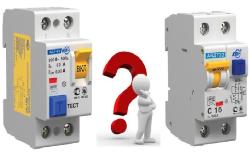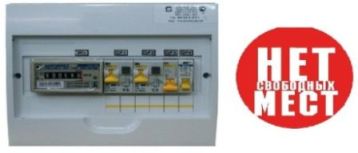Categories: Controversial issues, Automata and RCD
Number of views: 318792
Comments on the article: 28
What to choose? RCD or Differential Automatic
 In the process of his work on wiring, very often you hear the following question: what to choose - residual current device (RCD) or differential automaton? So let's find out what is actually better. Differential automatic machine or RCD.
In the process of his work on wiring, very often you hear the following question: what to choose - residual current device (RCD) or differential automaton? So let's find out what is actually better. Differential automatic machine or RCD.
I will tell you definitely. The correct answer to this question does not exist, because The choice between an RCD and a differential automaton depends on numerous factors.
But still, I’ll try to explain and give you the opportunity to make a choice on my own with examples.
Item 1. Free space in the shield
First of all, you need to determine if there is free space on the DIN rail in your apartment panel.

You will ask why?
I answer, with a slight change (reconstruction) in the wiring of your home, it is possible that the apartment panel will remain unchanged, and therefore your desires will not be able to come true for a simple reason - there is not enough space in the panel.
Differential automatic device takes up less space in the shield than a residual current device.
You all know that an RCD must protected by circuit breaker from short circuit currents and line (group) overload. Therefore, together with each RCD, it is necessary to install a circuit breaker next to it, which will take up additional space in the shield.
Item 2. Purpose
What is your goal when installing a differential circuit breaker or residual current device?

There is nothing complicated here either.
If you need protection against electric shock of a specific electrical appliance (washing machine, hot tub, water heater, etc.), then you just need to install a differential machine with the technical characteristics (rated load current, leakage current) of the particular electrical appliance that You choosed.
If you need protection from electric shock of any group (line) of outlets, then in this case it is advisable for you to use an RCD than a differential machine.
Why? Yes, for a very simple reason.
In the case of a change in the load current (dynamic load), and this can happen elementarily. Nowadays, electrical appliances of increasing power (computer power supplies, plasma TVs, refrigerators, electric kettles, jacuzzis, electric boilers, etc.) are increasingly used.
Due to the increase in load (power), the differential circuit breaker will start to shut down due to overload and it will have to be changed to a higher rated current. In the case of an RCD, you only have to change the circuit breaker.
Think for yourself what’s cheaper - differential machine or circuit breaker?
Item 3. Quality

At this point, I can say that most combined devices, and such a differential machine (contains the functions of a circuit breaker and RCD) are of lower quality than special devices designed specifically for a specific purpose (RCD).
According to this paragraph, the advantage is on the side of the RCD.
Item 4. Repair and replacement

From the experience of operating electrical devices, I can confidently say that there is nothing eternal. Each device has its own life. Therefore, in this paragraph I will set the condition for repair or replacement.
And again residual current device takes advantage in front of a differential machine.
In the event of a failure of an RCD or circuit breaker, either an RCD or an automatic machine must be replaced. And if the differential automaton fails, regardless of what reasons, it will have to be changed completely. On the financial side, these are completely different expenses.
Item 5. Power Supply

Again, the advantage in this paragraph on the side of the RCD.
In the event of an RCD fault and its replacement, the electrical power to your house (apartment, cottage) can be temporarily restored by installing a jumper between the circuit breaker and the load.
In a similar situation with a differential circuit breaker, temporary power supply can be done if you have another differential circuit breaker or circuit breaker in reserve.
Step 6. Reason for disconnection

If for any reason the RCD disconnected for you, then the reason for the disconnection on your face is that a leakage current appeared in the wiring of your apartment.
If for some reason you have turned off the circuit breaker that protects the RCD, then the reason for the trip on your face is that there is a short circuit or overload in the wiring of your apartment.
If for some reason the differential machine has shut off, then the reason for the shutdown UNKNOWN. Either leakage current or short circuit.
Conclusion

In this article, I do not impose anyone in the application of a device.
What is more preferable: a differential machine or an RCD is decided by each independently, depending on the above personal observation.
See also on this topic: Schemes of connection of RCD and difavtomatov
See also at i.electricianexp.com
:
